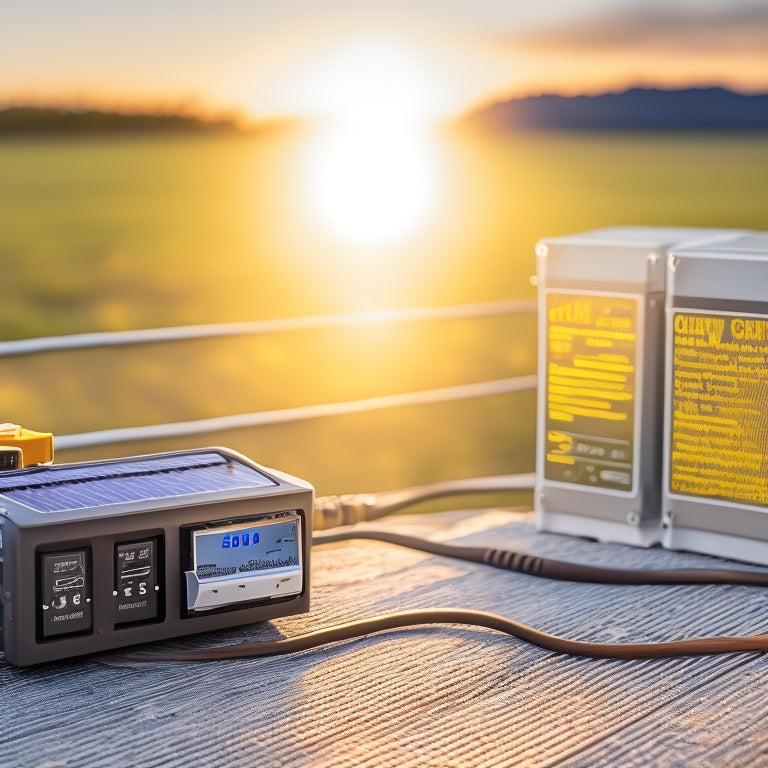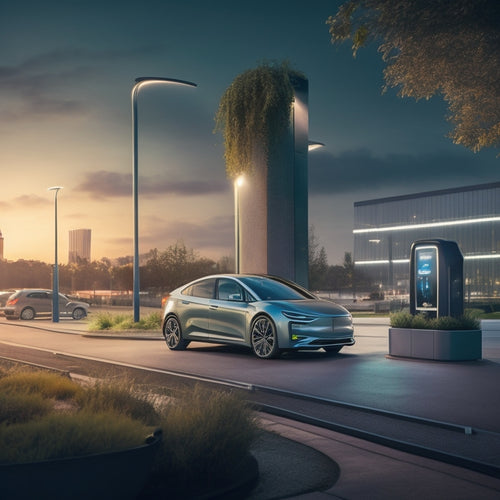
What Charge Controller for 12v Solar Battery
Share
When selecting a charge controller for your 12v solar battery, you'll want to take into account compatibility and performance. MPPT controllers are more efficient than PWM, especially in low-light conditions, enhancing energy capture. Verify the controller matches your battery type—lead-acid and lithium batteries require distinct charging profiles. Opt for one with multi-stage charging to prevent overcharging and extend your battery's lifespan. Features like temperature compensation are vital for maintaining performance. Regularly monitoring your system's efficiency also maximizes energy output. Investigate these options further to find the best solution for your solar setup.
At a Glance
- Select a charge controller based on battery type, ensuring compatibility with lead-acid or lithium batteries for optimal performance.
- MPPT charge controllers are recommended for better efficiency, especially in low-light conditions, compared to PWM controllers.
- Use multi-stage charging (bulk, absorption, float) to maximize energy capture and extend battery lifespan.
- Ensure the charge controller has features like temperature compensation to protect your battery investment.
- Regularly monitor battery state of charge to optimize performance and prevent overcharging or deep discharging.
Efficiency in Energy Management
To maximize efficiency in energy management, you need to implement ideal charging strategies that adjust to your solar battery's state of charge.
These strategies not only enhance energy capture but also greatly extend your battery's lifespan by preventing overcharging and deep discharging.
Proper management of the Ideal Depth of Discharge (DOD) is essential for maintaining battery health.
Optimal Charging Strategies
Efficient energy management in solar battery systems hinges on implementing ideal charging strategies customized to the unique characteristics of 12V batteries. To maximize performance, you need to choose the right charge controller types, such as PWM (Pulse Width Modulation) or MPPT (Maximum Power Point Tracking), based on your solar panel compatibility and energy needs.
MPPT controllers are generally more efficient, especially in low-light conditions, as they can extract more energy from your solar panels. However, if your system is smaller or less complex, a PWM controller may suffice, offering a cost-effective solution.
Next, consider the charging stages: bulk, absorption, and float. During the bulk phase, the charger delivers maximum current until the battery reaches a set voltage.
In the absorption stage, it reduces the current while maintaining the set voltage, ensuring full charge without overcharging. Finally, the float stage maintains the battery at a lower voltage to prevent self-discharge.
Battery Lifespan Extension
Maximizing battery lifespan hinges on effective energy management practices customized to your 12V solar battery system. To achieve this, focus on regular battery maintenance and monitoring of charging cycles. A well-maintained battery not only performs better but also enjoys a longer lifespan, freeing you from frequent replacements.
Start by ensuring your charge controller is properly configured. It should match your battery's specifications to optimize charging efficiency. Overcharging or undercharging can greatly shorten battery life, so aim for an ideal range during charging cycles. Additionally, consider using a smart charge controller that adjusts the charging profile based on real-time data. This adaptability helps prevent damage from prolonged exposure to high voltage.
Another critical aspect is temperature management. Extreme temperatures can affect battery performance and longevity. If possible, store your battery in a controlled environment to mitigate these effects.
Lastly, perform periodic inspections and maintenance. Clean terminals and check for any signs of wear or damage. By managing these factors, you can enhance your battery's performance and extend its lifespan, allowing you to utilize the full potential of your 12V solar system for years to come.
Cost Savings Over Time
By investing in a charge controller, you can considerably reduce your energy costs over time.
Not only does it optimize the charging process, but it also extends the lifespan of your 12v solar battery.
This improved efficiency allows for better energy management and promotes sustainable savings in your energy usage.
As a result, you'll see a notable decrease in replacement expenses and increased efficiency in your energy usage.
Reduced Energy Costs
When you invest in a charge controller for your 12v solar battery system, you're not just purchasing a piece of equipment; you're making a strategic move towards considerable cost savings over time. This investment plays an essential role in optimizing energy consumption, which directly correlates to reduced utility bills.
By efficiently managing the battery's charging and discharging cycles, a quality charge controller enhances energy efficiency, ensuring you get the most from your solar investment.
Implementing effective budgeting strategies becomes easier when you see a consistent drop in your energy expenses. As your reliance on conventional energy sources diminishes, you'll experience noticeable cost reduction in your monthly bills.
This shift not only aids in financial planning but also liberates you from the volatility of energy prices.
Additionally, the long-term benefits of reduced energy costs can greatly improve your overall financial health. With a charge controller, you're not just lowering your utility bills; you're also laying the groundwork for a sustainable future.
The combination of smart energy management and thoughtful financial planning allows you to take control of your energy needs, ensuring that your solar investment pays off for years to come.
Longer Battery Lifespan
Longevity is an essential factor in the overall efficiency of your 12v solar battery system. By optimizing your battery's lifespan, you're not just enhancing performance but also ensuring significant cost savings over time.
Effective battery maintenance is vital; it involves monitoring charge cycles, maintaining appropriate temperature levels, and using the right charge controller. A good controller can prevent overcharging and deep discharging, both of which can drastically shorten battery life.
When you integrate solar systems properly, you maximize energy capture while minimizing wear on your batteries.
Selecting a charge controller designed for your specific setup can lead to better energy management, thereby extending the life of your batteries. This means fewer replacements, less waste, and more money in your pocket in the long run.
Advanced Monitoring Capabilities
With advanced monitoring capabilities, you can track your solar battery's performance in real-time, ensuring ideal efficiency.
These features often include data logging, allowing you to analyze trends over time and make informed decisions about your energy usage.
By utilizing smart charging and monitoring features, you can enhance battery reliability and performance during outages, aligning with high round-trip efficiency.
Understanding these metrics is essential for maximizing the longevity and effectiveness of your solar system.
Real-time Performance Tracking
Utilizing advanced monitoring capabilities, a charge controller for a 12V solar battery enables real-time performance tracking that improves system efficiency and reliability. With real-time data at your fingertips, you can make informed decisions about your solar power setup.
This immediate feedback loop allows you to observe how your system's performance fluctuates with changes in sunlight, battery levels, and energy consumption. You'll gain significant performance observations, helping you identify any inefficiencies or issues before they escalate.
For instance, if your charge controller detects unusually low battery levels during peak sunlight hours, you can troubleshoot potential problems, such as shading or a malfunctioning panel, promptly. This proactive approach not only maximizes energy production but also extends the lifespan of your battery.
Moreover, advanced charge controllers often integrate with mobile apps or web interfaces, allowing you to monitor your system from anywhere. This level of accessibility guarantees you're always in control, enhancing your sense of freedom while utilizing solar energy.
Data Logging Features
How can data logging features enhance the performance of your solar power system? These features allow you to track essential metrics over time, providing perspectives into data trends and usage patterns. By analyzing this information, you can make informed decisions to optimize your solar setup.
With advanced data logging capabilities, you can monitor your energy generation, battery health, and load usage in real time. This helps you identify inefficiencies and adjust your system accordingly. For instance, if you notice a decline in energy production during certain periods, you can investigate potential shading issues or component malfunctions.
Moreover, understanding your consumption patterns enables you to forecast energy needs and adjust your usage habits. You might find you can shift non-essential loads to sunnier days, maximizing your solar energy utilization.
Many modern charge controllers offer user-friendly interfaces that allow you to visualize this data easily. This enables you to take control of your energy production and consumption, ensuring your system operates at peak efficiency.
Ultimately, data logging features give you the freedom to tailor your solar setup to your specific needs, helping you achieve greater independence from traditional energy sources.
Selecting Based on Battery Type
When selecting a charge controller, you'll need to take into account the type of battery you're using, as compatibility can vary greatly.
For instance, key considerations for selecting solar battery systems can help guide your choice of controller, as lead-acid batteries typically require different charging profiles compared to lithium batteries, impacting the efficiency and longevity of your power system.
Understanding these requirements guarantees peak performance and safety for your solar setup.
Lead-Acid Battery Compatibility
Selecting the right charge controller for your 12V solar battery setup depends on understanding lead-acid battery compatibility. Lead-acid chemistry is prevalent in solar applications due to its affordability and reliability. However, not all charge controllers are created equal; they must align with specific charging profiles customized to lead-acid batteries.
When you choose a charge controller, pay attention to the type of lead-acid battery you're using—flooded, AGM, or gel—as each requires distinct charging profiles. Flooded batteries need a bulk, absorption, and float stage, while AGM and gel batteries often require more precise voltage settings to avoid overcharging.
Matching the charge controller's settings with your battery type guarantees peak performance and longevity. Using a controller that supports multi-stage charging is crucial, as it adjusts the voltage and current throughout the charging cycle, enhancing the efficiency of your solar system.
Moreover, consider the controller's temperature compensation feature; it adapts to environmental changes, safeguarding your investment.
Lithium Battery Requirements
Understanding lithium battery requirements is vital for optimizing your 12V solar battery system. Lithium battery chemistry differs markedly from lead-acid types, and selecting the right charge controller is essential for effective battery management. You need to verify compatibility with your specific lithium battery to maintain efficiency and lifespan.
Here's a quick reference table for lithium battery requirements:
| Parameter | Recommended Value | Notes |
|---|---|---|
| Charge Voltage | 14.4V - 14.6V | Adjust based on battery model. |
| Discharge Voltage | 10.5V - 11.0V | Critical for battery protection. |
| Charge Current Limit | 0.5C - 1C | Depends on battery capacity. |
| Temperature Range | 0°C to 45°C | Avoid extreme temperatures. |
| Cycle Life | 2000 - 5000 cycles | Varies by usage and care. |
When choosing a charge controller, verify it supports lithium-specific profiles. This optimization not only enhances performance but also safeguards your investment. Proper battery management is vital to maximize efficiency and prolong the life of your system.
Enhanced Lifespan for Batteries
To enhance your battery's lifespan, you need to implement ideal charging practices.
Using a quality charge controller guarantees that your battery receives the right voltage and current, preventing overcharging and excessive discharge.
Optimal Charging Practices
Essential charging practices are crucial for enhancing the lifespan of 12v solar batteries. To maximize performance, you need to focus on efficient charge regulation and proper installation tips. Understanding your system's charging cycles allows for effective battery maintenance and energy storage management.
Here's a quick reference table to guide you:
| Practice | Description |
|---|---|
| Charge Regulation | Use the right controller types for peak charging. |
| Battery Maintenance | Regularly inspect and clean terminals and connections. |
| Solar Panel Integration | Confirm panels are aligned for maximum sunlight exposure. |
| Load Management | Balance energy consumption with storage capacity. |
| System Troubleshooting | Monitor efficiency metrics to identify issues early. |
Frequently Asked Questions
What Is the Difference Between PWM and MPPT Charge Controllers?
PWM controllers are simpler and cost-effective, making them ideal for smaller systems. However, MPPT controllers offer higher efficiency, optimizing energy harvest, especially in variable conditions, maximizing your power output and overall system performance.
Can I Use a Charge Controller With Multiple Batteries?
Sure, you can use a charge controller with multiple batteries! Just make certain you've got the right configuration—series or parallel. Keep battery compatibility and voltage regulation in mind for ideal battery balancing and performance.
How Do I Install a Charge Controller for My Solar System?
To install a charge controller, follow proper wiring techniques, ensuring battery compatibility. Connect the controller to your solar panels and batteries, check specifications, and secure connections. Monitor performance to maximize energy efficiency and system longevity.
What Safety Features Should I Look for in a Charge Controller?
When selecting a charge controller, you'll want to guarantee it includes overcurrent protection and temperature compensation. These features safeguard your system, enhancing its efficiency and longevity while promoting energy independence and safety in your solar setup.
How Do I Troubleshoot a Malfunctioning Charge Controller?
To troubleshoot charge controller issues, start by checking connections for corrosion or damage. Next, inspect the settings and verify they match your battery type. Finally, test voltage output to confirm functionality. Don't overlook firmware updates!
Explore More
In choosing the right charge controller for your 12V solar battery, you not only enhance energy efficiency, but you can also save up to 30% on replacement costs by extending battery life. By considering factors like battery type and monitoring capabilities, you'll optimize performance and longevity. Remember, a quality charge controller can greatly impact your solar setup's overall effectiveness, ensuring you get the most out of your investment while reducing downtime and maintenance needs.
Related Posts
-

Solid State Batteries in Electric Vehicles
Solid-state batteries revolutionize electric vehicles by offering a longer lifespan and higher energy density than tr...
-

Diy Off Grid Solar
By embracing DIY off-grid solar, you can break free from grid dependence, slashing your energy bills by up to 90% and...
-

Applications of Photovoltaic Systems
Photovoltaic systems are versatile, converting sunlight into electricity for various applications. You can use them i...


